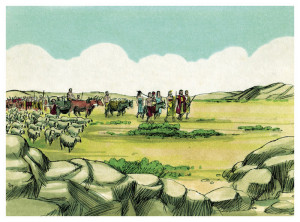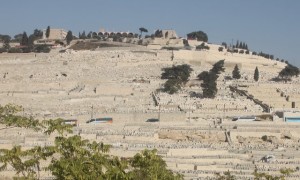God wil het! – XIII – Reizen in het spoor van de kruisvaarder
Israël: het land van belofte
Ongeveer 1800 jaar v. Chr. leidde Abraham een groep nomaden, van Mesopotamië naar de bergen van Kanaän in Palestina. Tijdens een hongersnood trokken ze verder naar Egypte, van waar ze rond 1250 v. Chr. onder leiding van Mozes de weg terug aflegden en opnieuw de bergstreken van Kanaän bevolkten. De Israëlieten stichtten een koninkrijk en kozen als eerste koning Saul (1023-1004 v. Chr.), die door zijn geadopteerde zoon David werd opgevolgd. David veroverde in 997 v. Chr. Jeruzalem en maakte daar de hoofdstad van zijn koninkrijk van. David werd opgevolgd door zijn zoon Salomon (965-928 v. Chr.). Tijdens zijn regering werd de eerste tempel gebouwd. Na Salomons dood werd het koninkrijk in twee delen opgesplitst: Israël en Juda. Rond 721 v. Chr. werd Israël door de Assyriërs veroverd. De Israëliërs verstrooiden zich en dit was het begin van de joodse diaspora, de wereldwijde verspreiding van joodse gemeenschappen. Juda werd in 587 v. Chr. Veroverd door de Babyloniërs (586-538), die Jeruzalem en de tempel verwoestten. Read more
God wil het! – XIV – Reizen in het spoor van de kruisvaarder
Jeruzalem: God wil het!
‘Jeruzalem sla uw ogen op en zie de bevrijder,
die uw boeien komt verbreken’ (Jesaja)
Vanuit de richting van Bethlehem trok het kruisleger door de heuvels van Judea naar Jeruzalem. Vanaf de Olijfberg keken ze neer op de muren en de heiligdommen van de oude stad, die net als in onze tijd verdeeld was in vier wijken: voor moslims, joden, Armeense christenen en Latijnse en orthodoxe christenen. De ongeveer vijfduizend christenen wonen tegenwoordig in de nabije omgeving van de Heilige-Grafkerk, de plaats waar Jezus zou zijn begraven na zijn kruisiging. Hier bevinden zich ook hun kerken, kloosters en pelgrimshuizen. De Franciscanen zijn de belangrijkste vertegenwoordigers van de Latijnse christenen en regelen hun zaken vanuit hun hoofdkwartier in het klooster van de Heilige Verlosser in de omgeving van de Jaffa poort. Met de Latijnen zijn de Grieks-Orthodoxen de meest dominant aanwezige christenen in het straatbeeld en in de wijk rond de Nieuwe poort bewoont hun kerkelijke elite de fraaiste huizen van de oude stad. Kleinere gemeenschappen zoals de Kopten, de Protestanten en de Ethiopiërs leven meer teruggetrokken in gebouwen die soms nog dateren uit de tijd van het vroegste christendom. De Ethiopische monniken wonen tussen de ruïnes van een door de kruisvaarders gebouwd klooster dat tegen de Heilige Grafkerk is aangebouwd. De Armenen namen aan het begin van de vierde eeuw als eersten het christendom aan en bewonen een van de grootste en ruimst opgezette wijken van de oude stad. Read more
Muslim Calvinism – Internal Security and The Lisbon Process In Europe
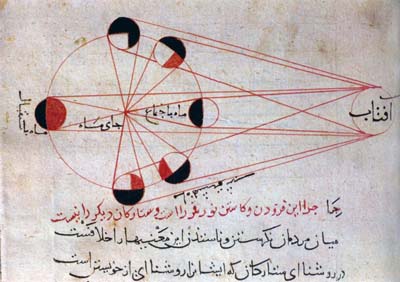 The European Social Survey Data, and Internal Security in Europe
The European Social Survey Data, and Internal Security in Europe
Muslim Calvinism systematically evaluates the freely available data, contained in international open sources, such as the European Social Survey, on the problems of internal security, and social policy in Europe. The book is the attempt to try to present an interpretation pattern for the complex reality of poverty; social exclusion, religious and societal values, and day to day contact of different population groups in Europe with the law.
The optimistic results of this study are in line with recent very sophisticated and advanced quantitative research results, especially by authors from the neo-liberal school of thinking, who maintain that instead of engaging in a culturalist discourse about the general “disadvantages” of Islam, Europe rather should talk about economic-growth-enhancing migration, property rights, discrimination against minorities on the labor markets, and that by and large, Islam is well compatible with democracy and economic growth (see also Noland M. (2004), Noland M. (2005), Noland M. and Pack H. (2004), Pettersson Th. (2006), Pryor F. (2006), Soysa I. De and Nordas R. (2006), and Tausch A. (2003)). If there is anything as “integration deficits” of the Muslim communities in Europe vis-à-vis the law, defined in this study along indicators of document fraud as well as indicators of lack of trust in the police and in European institutions, these deficits are caused rather by market imperfections and market failures in the European political economy, largely characterized by state intervention, and not by any intrinsic destabilizing or simply “evil” “character traits” of Muslims.
In many ways, the polarizing events in France are a kind of laboratory and testing ground for our theories – high state sector involvement, a mediocre Lisbon performance, and a high, and increasing poverty among the country’s Muslims, which all contribute to rising social tensions, violence and protest in the „banlieus”.
Read more
Zou ik misschien toch nog eventjes een klein vraagje mogen stellen?
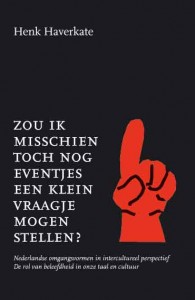 Vorig jaar zijn mijn vriend Arthur en ik voor het eerst op vakantie naar Spanje geweest. Ons budget was bescheiden en daarom kozen we voor onderdak in eenvoudige hotelletjes. We begonnen in Madrid, waar we een paar dagen verbleven in een pension in het centrum. Het kamermeisje, zo ontdekten we, had een dubbelrol: ze was ook aangesteld om het ontbijt te serveren. Dat ging haar niet echt handig af. De verschillende ingrediënten werden met onregelmatige tussenpozen zonder commentaar voor ons neergezet.
Vorig jaar zijn mijn vriend Arthur en ik voor het eerst op vakantie naar Spanje geweest. Ons budget was bescheiden en daarom kozen we voor onderdak in eenvoudige hotelletjes. We begonnen in Madrid, waar we een paar dagen verbleven in een pension in het centrum. Het kamermeisje, zo ontdekten we, had een dubbelrol: ze was ook aangesteld om het ontbijt te serveren. Dat ging haar niet echt handig af. De verschillende ingrediënten werden met onregelmatige tussenpozen zonder commentaar voor ons neergezet.
Desondanks verzuimde Arthur, die zich vóór ons vertrek had verdiept in het boekje ‘Hoe zeg ik het in het Spaans?’, geen enkele keer beleefd Gracias te zeggen. Eerst reageerde de serveerster enigszins verbaasd, maar daarna sprak er duidelijk irritatie uit haar houding. Arthur, die zich eveneens wat ongemakkelijk begon te voelen, bracht toen zwaarder geschut in stelling en bedankte met Muchas gracias! Deze formule had een totaal averechtse uitwerking; nu werd een vernietigende blik zijn deel. Tegenover mij barstte hij los: ‘Heb je ooit zo’n onbeschoft gedrag meegemaakt? Ze kent nog niet eens de meest elementaire normen van fatsoen!’
Tussen Arthur en het kamermeisje is het niet meer goed gekomen.
The Dutch Party for Freedom. An Analysis of Geert Wilders’ Thinking on Islam – Wartime
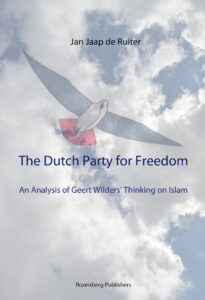 There’s been a lot of talk about Geert Wilders ever since he started his own party, the Dutch Freedom Party. He is prominently present in Dutch politics and that is how the world got to know him. His party has been very successful and from October 2010 until April 2012 it supported the minority government of Liberal Conservatives and Christian Democrats led by Prime Minister Mark Rutte (Liberal Conservative) in exchange for a number of demands.
There’s been a lot of talk about Geert Wilders ever since he started his own party, the Dutch Freedom Party. He is prominently present in Dutch politics and that is how the world got to know him. His party has been very successful and from October 2010 until April 2012 it supported the minority government of Liberal Conservatives and Christian Democrats led by Prime Minister Mark Rutte (Liberal Conservative) in exchange for a number of demands.
Wilders and his party entered the political arena with very strong opinions on Islam and Muslims, basically expressing the view that Islam is not a religion but an ideology. Muslims may be moderate, Islam never is. Islam, he claims, is a threat to Dutch society, to Europe, to the whole world even. When Geert Wilders and his party decided to support the minority government, they could not but also focus on less eye-catching dossiers of a socio-economic nature. The minority government had been in power for a little over a year when Wilders’ party discovered a new issue that would attract everybody’s attention.
In February 2012, it put up a website where people could vent their complaints about Eastern Europeans ‘who steal our jobs and cause innumerable nuisances by their antisocial drinking and shouting behavior’. Even though the website caused an enormous row, in particular in the European Parliament, the party did not withdraw it. Also in February 2012, the Freedom Party started negotiations with the two government parties on major extra budget cuts deemed necessary due to the financial crises in the world. Much to the annoyance of his fellow-negotiators, Wilders pulled out at the last minute, claiming that now that the necessary calculations had been made by the Bureau for Economic Policy Analysis (CPB) he could not live with the financial consequences the cuts would have for his voters, and the government fell. In the weeks before the elections, on 12 September 2012, the Freedom Party focused virtually entirely on ‘the Evil that is Europe’. Muslims or Eastern Europeans were apparently no longer an issue. The parliamentary elections of 12 September 2012 resulted in a major blow to the Freedom Party, which lost nine of its 24 seats. It was the second blow to hit the party, the first one being the downfall of the Rutte government, which was primarily caused by Party leader Wilders. Both events marked a major loss of political power for the Party. This did however not result in the use of a milder discourse when it comes to the Party’s policies and focus on Islam and Muslims. On the contrary. Read more
The Speck in Your Brother’s Eye – The Alleged War of Islam Against the West – Truth
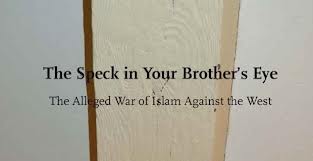 Marked for Death contains 217 pages and the words ‘truth’ or ‘true’ are mentioned in it at least eleven times. As an academic I am suspicious of the word ‘truth’. I teach my students that undoubtedly, there is such a thing as the truth, but each one of us, including those we see as great thinkers, has his own concept of what the truth is. It was Socrates who postulated that what we see around us is not the real world, that what we see is but an image of it and that we can in effect hardly see reality and if so only with a great deal of effort. Philosopher Immanuel Kant argues that basically we cannot know things, we can only guess at what ‘reality’, at what is ‘real’.
Marked for Death contains 217 pages and the words ‘truth’ or ‘true’ are mentioned in it at least eleven times. As an academic I am suspicious of the word ‘truth’. I teach my students that undoubtedly, there is such a thing as the truth, but each one of us, including those we see as great thinkers, has his own concept of what the truth is. It was Socrates who postulated that what we see around us is not the real world, that what we see is but an image of it and that we can in effect hardly see reality and if so only with a great deal of effort. Philosopher Immanuel Kant argues that basically we cannot know things, we can only guess at what ‘reality’, at what is ‘real’.
Friedrich Hegel does not rule out man fully knowing things, but foresees perfect knowing as a result of a long development the end of which we have not reached as yet. The apostle Paul also claims that as yet we do not know things fully (1 Corinthians 13: 12): ‘For now we see in a mirror, dimly, but then face to face. Now I know in part; then I shall understand fully, even as I have been fully understood’.
Knowing things, knowing reality is not only a subject that occupies the minds of academics, thinkers, philosophers and theologians. It concerns each one of us. If asked to describe an event they have witnessed, different people tend to give different versions of it and may disagree with each other’s interpretations. This is not limited to daily events, but also goes for major events in people’s countries or for things happening in the world. Some may blame the present economic crisis on the irresponsible behavior of banks, while others may claim with equal force that the crisis has been caused by mass immigration. Read more
